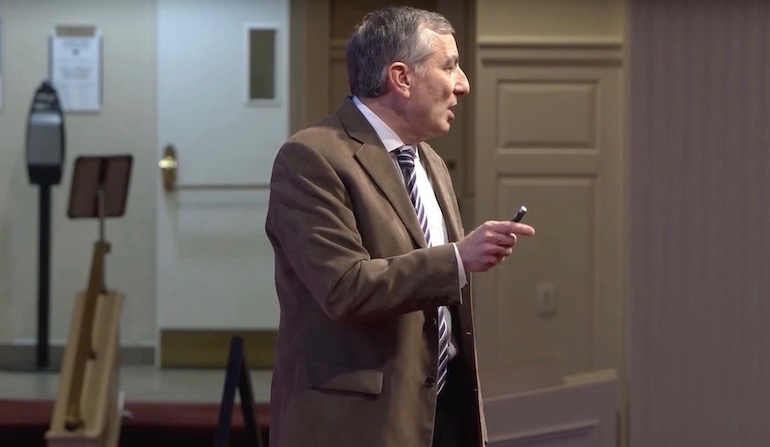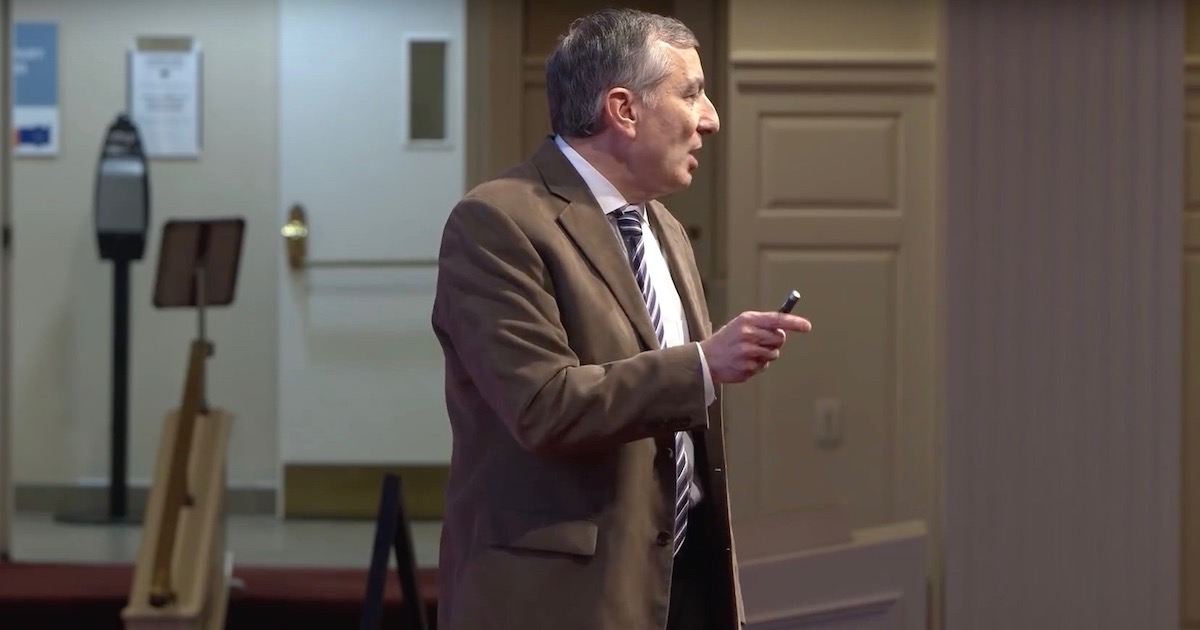 Evolution
Evolution
 Intelligent Design
Intelligent Design
Tour: A “Time Out” for Origin-of-Life Community


You have to feel bad for origin-of-life scientists, with Professor James Tour increasingly on their case. The famed Rice University synthetic organic chemist has delivered speeches, written articles, and appeared in the Science Uprising series, hammering away at the failures of OOL research. The mystery of life’s origin may be admitted by these researchers, but typically before offering claims that they’re hot on the trail of solving it. Which they emphatically are not.
Rarely do they admit the abysmal “depths of the problems facing” them, as Tour puts it.
A Step Further
Now in the journal Inference he goes a step further. Tour calls on the OOL community to take a “time out,” as parents of young kids are accustomed to do. After years of agitated and misleading media claims drawing on the statements of scientists (“Amazing discovery may hold key to the origins of life”! “Found: the origin of life”!), but infrequently contradicted by those same scientists, Professor Tour thinks a new approach is in order. It’s time to “step outside, or take a break in your room, and cool off before you’re ready to come back and try again.”
Actually, that’s not Tour. It’s what I say to my own young kids, but it amounts to the same thing. From “Time Out”:
In 1952, Stanley Miller and Harold Urey derived a number of racemic amino acids from a handful of small molecules. These were electrifying results because they suggested that the methods of synthetic chemistry might finally explain the origins of life. The excitement was justified, but premature.1 Origins of life (OOL) research has, to be sure, become progressively more sophisticated, but its goal — to explain the origins of life — remains as distant today as it was in 1952. This is not surprising. The protocols in use have remained unchanged: buy highly purified chemicals; mix them together in high concentrations and in a specific order under carefully devised laboratory conditions; derive a mixture of compounds; and publish a paper making bold claims about OOL. These protocols are as unrealistic as they are unimproved.
This essay comprises an argument, but it also contains an appeal to the OOL community. The history of science suggests that on occasion what is required for research to flourish is not further research — at least to the extent that further research involves doing the same thing. This is one of those times.
Further Funding
“Further research,” meaning further funding, is what they’re always calling for. That may explain why researchers appear insensitive to the true abysm of ignorance in which their work so far has left us. Tour has tried to make this clear, but his colleagues don’t seem to want to hear it.
I have discussed these issues with OOL researchers, and I am amazed that they fail to appreciate the magnitude of the problem in building molecules. They see little difficulty in accepting a chemical synthesis where a desired product is mixed with a large array of closely related yet undesired compounds. They seem unaware that separations would be enormously complex, and subsequent reactions unavailing. In a 2018 article for Progress in Biophysics and Molecular Biology, Edward Steele et al. concede the following.
“The transformation of an ensemble of appropriately chosen biological monomers (e.g. amino acids, nucleotides) into a primitive living cell capable of further evolution appears to require overcoming an information hurdle of superastronomical proportions, an event that could not have happened within the time frame of the Earth except, we believe, as a miracle. All laboratory experiments attempting to simulate such an event have so far led to dismal failure.”
“At this stage of our scientific understanding,” they write, “we need to place on hold the issue of life’s actual biochemical origins — where, when and how may be too difficult to solve on the current evidence [emphasis added].”25 All is not lost. If life on earth did not arise on earth, “[i]t would thus seem reasonable,” Steele et al. remark, “to go to the biggest available ‘venue’ in relation to space and time. A cosmological origin of life thus appears plausible and overwhelmingly likely.” Why chemical reactions that are unlikely on the earth should prove likely somewhere else, Steele et al. do not say.
An Objective Solution
The widely unacknowledged impasse has an objective solution, Tour thinks: taking a time out, if only for now.
It is time for a temporary time out. Why not admit what we cannot yet explain: the mass transfer of starting materials to the molecules needed for life; the origin of life’s code; the combinatorial complexities present in any living system; and the precise non-regular assembly of cellular components?
It would be helpful if leading researchers, among them very sophisticated synthetic chemists, were to step back, pause, and join forces. If the origins of life remain a mystery, two goals are within reach: an agreement about the rational standards by which OOL research should be judged, and a candid acknowledgment of the problems that remain to be overcome. A statement of this sort would be reassuring in its candor.29
Ur Text of Intelligent Design
Reassuring, but unlikely. Up till now, the community has been happy — if not happy, why don’t they loudly protest? — to have the media and therefore the public thinking they are zeroing in on solving the mystery of life’s origin. A book with that title (The Mystery of Life’s Origin) was published in 1984 by Thaxton, Bradley, and Olson, an Ur text of the modern intelligent design movement. (That’s Walter Bradley, by the way, whose name was honored with the founding of Discovery Institute’s Bradley Center for Natural and Artificial Intelligence.) Since 1984, the mystery has remained untouched by any approach that assumes a purely materialist solution.
And yet the media narrative goes on, and the scientists, when they protest, direct their protests not so much at the media as at the skeptics and mavericks, such as Tour himself or the proponents of ID. These people not objective. That why, for all that Tour’s proposal makes sense, I doubt his colleagues will take him up on it.
Photo at the top: Professor James Tour speaking on “The Mystery of the Origin of Life,” Dallas Conference on Science & Faith.
